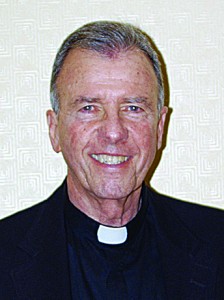Tenth in a series
During the last few months when members of the discussion group that I moderate have gathered to discuss Father James Martin’s book, The Jesuit Guide to (Almost) Everything: A Spirituality for Real Life (HarperOne, An Imprint of HarperCollins Publishers, 2010, 432 pages, $26.99), they break into superlatives about how much they enjoy the book and which sections that they have found especially helpful in their efforts to lead a Christian life. All the members of the group are so enthusiastic about the book that they are hoping to have an opportunity to meet Father Martin. Two of them attended a talk he gave in Queens. They were not disappointed.
As I re-read the book with the group I find I am challenged again by Father Martin’s insights and encouraged by his observations. Recently I re-read a section of the book on poverty of spirit and it spoke to me so directly that I marveled not only at his insights but at the clarity with which he expressed them. The section deals with a topic I have been struggling with for years.
Members of the discussion group regularly bring up the problem of the millions of people in the world who suffer from extreme poverty. One-third of the world’s population is starving. All of us in the group periodically feel guilty that we have so much and so many have so little. In light of the disparity of wealth in the world, talk about poverty of spirit can seem relatively unimportant. I don’t think so. Father Martin makes clear that poverty of spirit is something that everyone, including multi-millionaires, should have.
In his treatment of spiritual poverty, Father Martin refers to a book that I have wanted to read but have not yet gotten to it. The book is Poverty of Spirit by the German Catholic theologian, Johannes Baptist Metz, a disciple of the great Catholic theologian, Karl Rahner. Father Martin writes the following:
“Metz speaks of poverty of spirit as the inherent limitations that every human being faces in daily life. It is the spiritual awakening that comes with knowing not only the talents and gifts given us by God, which fill us with a grateful confidence, but also our limitations. Poverty of spirit means accepting that we are powerless to change certain aspects of our lives. ‘We are all members of a species that is not sufficient unto itself,’ he writes. ‘We are all creatures plagued by unending doubts and restless, unsatisfied hearts.’
“Poverty of spirit also means accepting that everyone will face disappointments, pain, suffering, and, eventually, death. Though this should be obvious to anyone who has thought seriously about life, Western culture often encourages us to avoid, ignore, or deny this essential truth – we are limited, finite, physical: human. And part of being human is that we sometimes suffer and are often powerless over what happens to us, to others, and to the world around us. Accepting this means moving closer to poverty of spirit.” (p. 206)
I believe that re-reading this section of the book was providential. Around that time I was suffering from a mild attack of arthritis. The discomfort occupied my consciousness. I woke up in the morning thinking about it. I went to class thinking about it. I read newspapers thinking about it. For years I have been trying to stay healthy. Listening to various doctors’ advice and being committed to a daily exercise regime, I guess I thought that I would not be subject to the normal physical diminishment that is part of the aging process. How foolish! Because of the insights of Fathers Metz and Martin, I now look upon my mild arthritis as a “message” from God, perhaps a grace and a blessing. I still hope that the arthritic experience disappears but while it is present I hope my outlook has changed.
Father Martin links poverty of spirit to humility. He writes:
“Poverty of spirit is another way of speaking of humility. Without it, we resist admitting our reliance on God, are tempted to try to make it on our own, and are more likely to despair when we fail. And since spiritual poverty recognizes our fundamental reliance on God, it lies at the heart of the spiritual life.” (p. 206)
Father Robert Lauder, a priest of the Diocese of Brooklyn and philosophy professor at St. John’s University, Jamaica, writes a weekly column for the Catholic Press.

